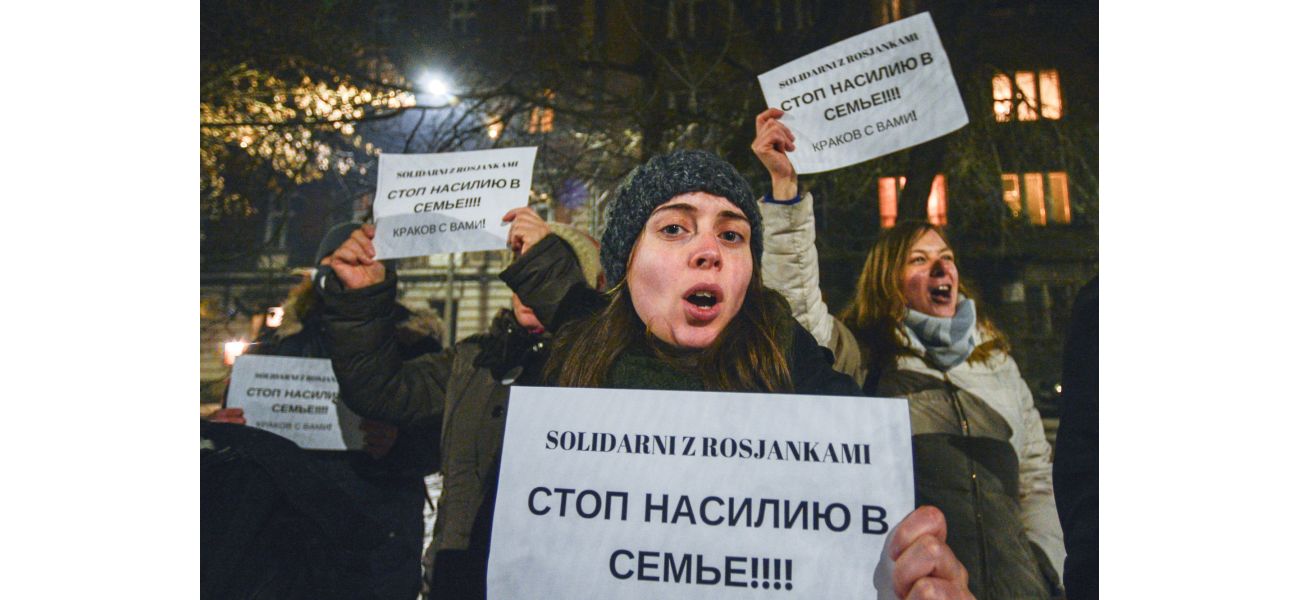Short videos on TikTok showcase Russian men’s chivalrous acts, but this may be masking a larger issue of domestic abuse.
In Russian culture, violence is often seen as a sign of affection.
December 19th 2024.

As we scroll through our social media feeds, we often come across phrases or quotes that stick with us. One such phrase, "If he beats you, he loves you," has been circulating in Russia for decades. It's a disturbing proverb that women have turned to for solace, believing that domestic violence is a sign of love. But where did this saying come from?
Turns out, it originated from a set of 16th-century household rules known as Domostroy. These rules were meant to guide families on how to maintain traditional values in the home. However, in today's Russia, these values have been weaponized by President Vladimir Putin to justify and even encourage domestic abuse. According to Human Rights Watch, abusers are thriving under Putin's rule, and the issue of domestic violence continues to be masked by the country's supposed commitment to "traditional family values."
But on TikTok, the popular social media platform, we see a different narrative. Russian men are portrayed as gentlemen and providers in videos filmed on the streets of Moscow. They are asked about their views on paying for dates, buying flowers and gifts, and whether they believe in traditional gender roles. The responses are often positive, with one man stating that it's totally normal for men to take on the financial responsibility in a relationship.
The interviews are juxtaposed with Westerners who insist on splitting expenses equally, and the comments section is flooded with admiration for Russian men. Some even go as far as to say that Americans have it all wrong and they should move to Russia. While these videos may paint a flattering picture of Russian men, they fail to address the country's alarming issue of domestic abuse.
In fact, according to domestic violence organization Nasiliu.net, a violent crime is committed in a Russian family every 10 minutes. However, the lack of complete statistics and the decriminalization of domestic abuse in 2017 has distorted the situation. The official data provided by the Russian government only includes crimes committed against spouses, children, and parents. This excludes former spouses, sexual partners, and any other family members who may also be victims of abuse.
The decriminalization of domestic abuse has only made it easier for abusers to get away with their actions. The burden falls on the victim to prove the crime, and many women are discouraged from reporting the abuse to authorities. In fact, some victims have shared their experiences of being blackmailed by the police into dropping their cases. With no official procedure for reporting abuse, the system fails to protect the most vulnerable demographic groups – women and children.
In a recent initiative, the Russian government has introduced the presence of a "psychologist-moderator" in cases of divorce. While the idea may seem helpful in resolving conflicts between couples, it only delays the process for victims of domestic abuse who are desperate to leave their abusers. The lack of state-operated shelters and restraining orders in cases of stalking also makes it difficult for women to escape their abusers.
The situation has only worsened in recent years, especially since the start of Russia's war in Ukraine. Human Rights Watch has reported a spike in domestic abuse cases, with some of the most severe incidents involving men returning from the frontline. This trend has been particularly alarming, with some of the perpetrators being former mercenaries and ex-prisoners released by the regime to boost the army. Even Russia's own human rights commissioner has acknowledged the worsening state of domestic violence in the country.
It's clear that Russia has a problem with domestic abuse, and the government's lenient approach and lack of action only make it worse. The issue is deeply rooted in societal beliefs and values, with the dangerous proverb "If he beats you, he loves you" being just one example. As we continue to raise awareness and demand change, let's not forget the women and children who are suffering in silence. It's time to break the cycle of violence and protect the most vulnerable members of our society.
Turns out, it originated from a set of 16th-century household rules known as Domostroy. These rules were meant to guide families on how to maintain traditional values in the home. However, in today's Russia, these values have been weaponized by President Vladimir Putin to justify and even encourage domestic abuse. According to Human Rights Watch, abusers are thriving under Putin's rule, and the issue of domestic violence continues to be masked by the country's supposed commitment to "traditional family values."
But on TikTok, the popular social media platform, we see a different narrative. Russian men are portrayed as gentlemen and providers in videos filmed on the streets of Moscow. They are asked about their views on paying for dates, buying flowers and gifts, and whether they believe in traditional gender roles. The responses are often positive, with one man stating that it's totally normal for men to take on the financial responsibility in a relationship.
The interviews are juxtaposed with Westerners who insist on splitting expenses equally, and the comments section is flooded with admiration for Russian men. Some even go as far as to say that Americans have it all wrong and they should move to Russia. While these videos may paint a flattering picture of Russian men, they fail to address the country's alarming issue of domestic abuse.
In fact, according to domestic violence organization Nasiliu.net, a violent crime is committed in a Russian family every 10 minutes. However, the lack of complete statistics and the decriminalization of domestic abuse in 2017 has distorted the situation. The official data provided by the Russian government only includes crimes committed against spouses, children, and parents. This excludes former spouses, sexual partners, and any other family members who may also be victims of abuse.
The decriminalization of domestic abuse has only made it easier for abusers to get away with their actions. The burden falls on the victim to prove the crime, and many women are discouraged from reporting the abuse to authorities. In fact, some victims have shared their experiences of being blackmailed by the police into dropping their cases. With no official procedure for reporting abuse, the system fails to protect the most vulnerable demographic groups – women and children.
In a recent initiative, the Russian government has introduced the presence of a "psychologist-moderator" in cases of divorce. While the idea may seem helpful in resolving conflicts between couples, it only delays the process for victims of domestic abuse who are desperate to leave their abusers. The lack of state-operated shelters and restraining orders in cases of stalking also makes it difficult for women to escape their abusers.
The situation has only worsened in recent years, especially since the start of Russia's war in Ukraine. Human Rights Watch has reported a spike in domestic abuse cases, with some of the most severe incidents involving men returning from the frontline. This trend has been particularly alarming, with some of the perpetrators being former mercenaries and ex-prisoners released by the regime to boost the army. Even Russia's own human rights commissioner has acknowledged the worsening state of domestic violence in the country.
It's clear that Russia has a problem with domestic abuse, and the government's lenient approach and lack of action only make it worse. The issue is deeply rooted in societal beliefs and values, with the dangerous proverb "If he beats you, he loves you" being just one example. As we continue to raise awareness and demand change, let's not forget the women and children who are suffering in silence. It's time to break the cycle of violence and protect the most vulnerable members of our society.
[This article has been trending online recently and has been generated with AI. Your feed is customized.]
[Generative AI is experimental.]
0
0
Submit Comment





